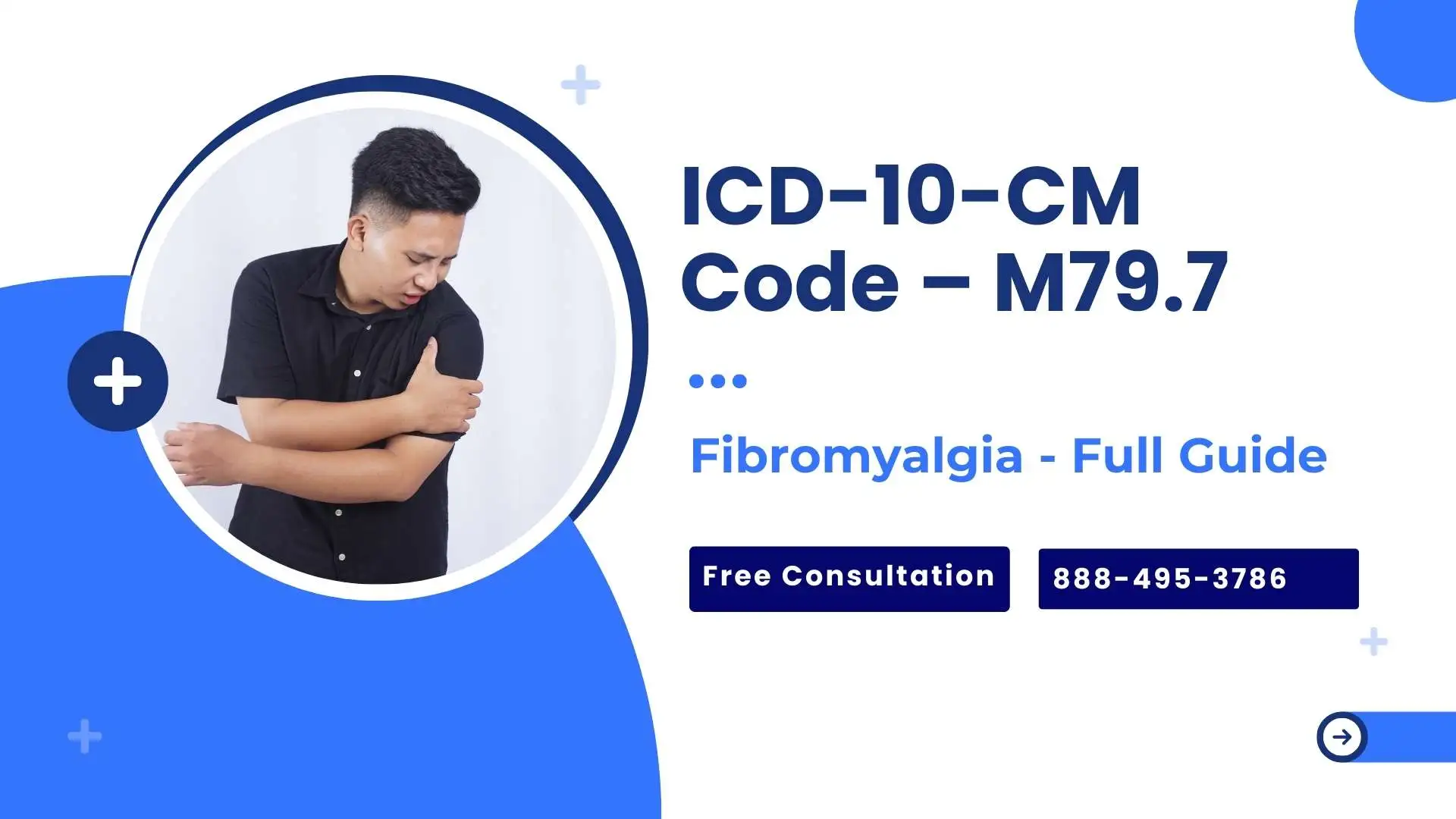Fibromyalgia is a condition that results in pain all over the body. Individuals with it may also feel fatigued, have sleeping problems, and moodiness. This cannot be detected in medical tests and is therefore often missed. But doctors and insurance companies use a special code to recognise it — the ICD-10 code M79.7.
In this blog post, we will explain everything you need to know about the fibromyalgia ICD-10 code, also called ICD-10-CM M79.7. We will make it simple so that you don’t get confused with difficult medical terms. Keep reading!
Importance of the ICD-10 Code for Fibromyalgia
As each health issue has its own code, the fibromyalgia code is M79.7. In medical records, the ICD-10 code for fibromyalgia helps doctors know in detail what the real condition is. They also include it in patients’ records and on insurance forms. This reconfirms the diagnosis and allows the patient to get the proper treatment, insurance help, and support programs.
Therefore, it does not matter whether you are a patient seeking to interpret your health data or a medical biller coding a claim; the ICD-10 code fibromyalgia will play the leading role.
What Does M79.7 Mean?
As mentioned above, the code M79.7 is specifically for Fibromyalgia. Here is an analysis of what it signifies:
- M: Stands for musculoskeletal-related system.
- 79: Includes other soft tissue disorders.
- .7: Is the specific code for fibromyalgia itself.
This code tells doctors that the patient has pain in the whole body, but an injury or any known illness does not cause it. Also, remember not to mix fibromyalgia ICD-10 with other kinds of chronic pain to avoid confusion.
How the ICD Code for Fibromyalgia help in Medical Billing?
Insurance companies, hospitals, and clinics must utilize proper codes. The failure to enter the appropriate ICD code for fibromyalgia may delay or even deny the insurance claim of a patient.
The use of M79.7 gives a clear message. It informs the insurance company about the diagnosis of fibromyalgia and that the patient requires some treatment, medication, or therapy. With the correct code, it can be for physical therapy, counseling, or prescription drugs, and everything is smoother.
Is There a Difference between Myofascial Pain Syndrome?
Many people have a misunderstanding between Fibromyalgia and Myofascial Pain Syndrome because both disorders involve muscle pain. Indeed, they cannot be described as equals. And yes, there are also their codes.
Myofascial pain syndrome, in most cases, targets specific trigger points in the muscles. In contrast, fibromyalgia pain is more general and has fatigue and sleeping difficulties in addition.
The ICD 10 myofascial pain syndrome’s code is usually M79.1, which is not similar to the code of fibromyalgia. It is necessary to understand the difference between the two for both diagnosis and billing.
The wrong treatment or claim issues may arise when using the wrong code. And as much as the symptoms may appear to be similar, the ICD-10 code for fibromyalgia and the code for myofascial pain syndrome do not need to be interchanged.
Why the Fibromyalgia ICD-10 Code Matters for Patients
If you are living with fibromyalgia, then it matters a lot to have that diagnosis in your health record. It implies that doctors, therapists, and even medical insurance companies will take you more seriously.
Many patients suffer silently with this problem because X-rays or blood tests cannot detect it. However, when your doctor enters the ICD-10 fibromyalgia code, it becomes a formal one in your record. This opens doors to:
- Better treatment options
- Pain management plans
- Mental health support
- Physical therapy
- And even disability claims, if needed
M79.7 is a relatively small number, but it can bring significant changes in the quality of care you receive.
Common Treatments for ICD-10 Fibromyalgia Patients
Physicians commonly suggest the following treatments for persons with fibromyalgia, ICD-10 code:
- Medications
- Physical therapy
- Exercise and stretching activities
- Counselling to decrease stress and depression
- Better lifestyle, diet, sleep, etc
Doctors design various treatment plans for each person, as fibromyalgia varies with each person. But if the ICD-10 code for fibromyalgia is not added to the system, it becomes hard to get the proper treatment or even book it properly.
ICD 10 Code Fibromyalgia and Disability Claims
The other factor that makes the fibromyalgia ICD-10 code important is for those people seeking disability benefits. In many cases, fibromyalgia can limit a person’s ability to work full-time or even part-time.
M79.7 in your medical history can also aid in proving the fact that this condition is real and you need help. Most disability programs, such as Social Security in the U.S, require documented medical evidence. One of such pieces of evidence is the ICD-10 fibromyalgia code. And so, if you want to take the benefits, you need to ensure that your doctor has coded M79.7 in your record.
How Often is M79.7 Used?
Over the past years, the fibromyalgia ICD-10 code has increased in use. It is because a greater number of doctors are coming to know that fibromyalgia is a serious illness. It is also due to increased awareness of patients and the relevant questions that they are asking.
The medical planet is slowly changing. The more use of the ICD-10 code of fibromyalgia also means the patients have more chances of proper care, and research funding will increase.
Tips for Patients and Caregivers
In case you or a friend has been diagnosed with fibromyalgia, then the following tips will help you:
- Ensure that your physician includes the M79.7 in your file.
- Keep a photocopy of your medical reports containing the code.
- Some plans need proof through ICD codes.
- Providing friends, family, and even employers with the correct code will enable them to learn more about your condition.
The better informed you get about the ICD-10 for fibromyalgia, the better you will be able to control your treatment process.
For cases where fibromyalgia impacts cognitive or psychological health, understanding CPT codes 96132 and 96133 can help with proper neuropsychological testing and evaluation billing.
Final Words!
To finalise, fibromyalgia is a serious disease that is always challenging to live with. However, the positive fact is that it has an official position in the medical community. With the ICD-10 code for fibromyalgia (M79.7), the patients now have the care, support, and coverage that they need.
Don’t consider his code as just a series of numbers; it is a step towards increased care, better understanding, and improved lives for people who struggle with this complex condition. Are you a patient, caregiver, or healthcare worker? It has been proven that it is easy to forget the ICD code of fibromyalgia, but by having the code in mind, it will be of great help.
Need Help Understanding or Using ICD Codes in Medical Billing?
Whether you are a medical biller or a healthcare provider seeking assistance with fibromyalgia ICD-10 coding or claim submission, you can find the help you need. Contact Providers Care Billing LLC professionals now; we are here to ensure your work is made easier, quicker, and more accurate.




